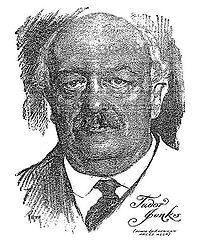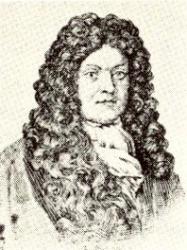
1857 - 1922 Topics: The Lord Jesus Christ Advent and Nativity Author of "Like until His Brethren" in The Pilgrim Hymnal Jenks, Tudor, an American journalist, is the author of "When mother love makes all things bright" (Sympathy), which appeared in The Outlook, N. York, Christmas 1895.
--John Julian, Dictionary of Hymnology, New Supplement (1907)
==========================
Tudor Storrs Jenks (May 7, 1857 - February 11, 1922) was an American author, poet, artist and editor, as well as a journalist and lawyer. He is chiefly remembered for the popular works of fiction and nonfiction he wrote for children and general readers.
Jenks was born on May 7, 1857 in Brooklyn, New York, the son of Grenville Tudor Jenks and Persis Sophia (Smith) Jenks. His older brother was Almet F. Jenks, presiding justice of the appellate division of the New York Supreme Court. His younger brother Paul E. Jenks served as American Vice Consul in Yokohama, Japan. He was a grand-nephew of Wendell Phillips. He married, October 5, 1882, Mary Donnison Ford. They had three daughters, Dorothy, Pauline, and Amabel, the last of whom Jenks collaborated with on a play. He lived in Bronxville, New York, where he died at his home, of apoplexy, on February 11, 1922. He was survived by his wife and daughters.
Jenks graduated from Brooklyn Polytechnic Institute in 1874, Yale University in 1878, and Columbia Law School in 1880. He studied art in Paris in the winter of 1880-1881. Among his classmates at Yale were William Howard Taft, afterwards president of the United States, and Arthur Twining Hadley, later president of the university. During his attendance there he became a member of Skull and Bones and Delta Kappa Epsilon.
Jenks practiced law in New York City from 1881–1887, following which he served on the staff of St. Nicholas Magazine as an associate editor from November 1887-October 1902. Afterwards he resumed law practice with the firm of Jenks & Rogers, of which his brother Almet was the senior partner. He was also a professional writer throughout his working life. His shorter works appeared in numerous magazines, including The American Magazine, Art World and Arts and Decoration, Book Buyer, The Bookman, The Century, Chautauquan, The Critic, Current Opinion, The Era, Everybody's Magazine, Good Housekeeping, Harper's Bazaar, Harper's Monthly Magazine, Harper's New Monthly Magazine, Harper's Weekly, International Studio, Journal of Education, Ladies' Home Journal, Lippincott's Monthly Magazine, Living Age, Munsey's Magazine, Outing, St. Nicholas, The Cosmopolitan, The Independent, The Outlook, Woman's Home Companion, and World's Work. They were extensively anthologized during his own time. His books, almost all of them juveniles, were published by the Henry Altemus Company, A. S. Barnes & Company, Thomas Y. Crowell & Company, Doubleday, and F.A. Stokes Co., among others. Several were illustrated by John R. Neill. Jenks was a member of the Authors' Club.
--en.wikipedia.org/wiki
Tudor Jenks


 My Starred Hymns
My Starred Hymns




